Beth Kephart's Blog, page 131
May 21, 2013
Night Swim/Jessica Keener: Reflections

I took this photograph from a crowded Amtrak train, headed home to Philadelphia following a day spent in DC. I had gone to surprise my thirteen-year-old niece on her birthday, to see my sister and her family. Hidden within my bag of gifts was a single book, Night Swim, by Jessica Keener.
It's a book I'd bought months ago, a book that has always sat right there, on the top of my massive TBR. Jessica is what they call a Facebook friend, but she has always seemed, to me, far more substantial than that. When she comments on something, her words have gravitas. When she shares a moment in her life, it most often acts as a form of outreach, as an idea bigger than herself.
It was, then, with that sense of tugging familiarity that I began to read Night Swim, a debut novel for adults that has a teen at its center. Sarah Kunitz (lovers of poetry will recognize the power of her last name) is growing up in the 1970s, in a suburb of Boston, in a home of muted stresses. Her mother—beautiful, loving—occupies a buffer zone, needing pills to dull her aches, parties to bolster her confidence, a live-in maid to clear the dishes, more wine. Sarah's professor father, meanwhile, is strict and, in his own way, remote, losing control of his four children as time goes by. Sarah's mother almost dies, and a hush settles over the house. Then Sarah's mother does, indeed, die, and this hush is disturbing, tilted, suffused with a terrible drowning sound. Sarah is sixteen. She'll have to find her way. But the path ahead isn't marked.
Jessica writes quietly, forcefully, and with great knowing about remorse, wrong choices, brief releases, forever shadows. She writes with heart about a daughter's greatest loss—a mother. Just days before I read this novel, I had sat on a bench beside my own mother's grave, trying to tell her stories, wishing there was someway to get through. And so, on that train to and from DC, and then again in the quiet hours of this afternoon, I felt Jessica's own understanding of something we almost all come to face, in our lives. I felt, with this sadness, less alone.
From Night Swim, bought long ago, but perhaps read at the right time:
I turned over but repositioning my body didn't help at all. I turned back over. Mother's death became my life sentence, a different kind of imprisonment, and I realized that Eliot might be right about ghosts. This one had slipped inside me, pacing for public recognition, seeking that salve of music, a restless, circular longing for condolence and release.




Published on May 21, 2013 14:57
Dr. Radway and Dangerous Neighbors: a side-by-side review
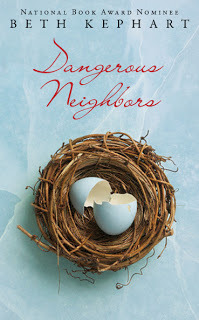
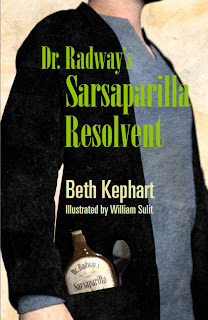
Readers of this blog know that Dr. Radway's Sarsaparilla Resolvent is a story featuring a boy named William—a child of Bush Hill and Baldwin Locomotive Works, the brother to a young man murdered by a cop. William has lived in my imagination for many years. He was a primary character (but not the primary character) in my Centennial Philadelphia novel, Dangerous Neighbors. He rescues lost animals for a living. He matters to me.
Earlier today, I discovered that my friend Ed Goldberg, a librarian in the New York system, put Dr. Radway and Dangerous Neighbors side by side in a review. I love that he did this. I learned from his study. I'm deeply appreciative.
Ed's entire report can be found here, on his lovely blog, 2HeadsTogether. He ends his musings like this:
What both books do so well is describe one city, Philadelphia of the
1870s, although two different worlds. Both books delve into their main
characters, William and Katherine, making them come alive. And both
books use language as only Beth Kephart uses language.
It was a luxury reading the books one after the other, because it
highlights the contrasts that otherwise would have been hidden. So, Dr. Radway’s Sarsaparilla Resolvent and then Dangerous Neighbors. The one-two punch in books.
Thank you, Mr. Ed. And thank you, Elizabeth Mosier, for the extraordinary note you wrote to me after you read the book through. No one can ever know just how much words like these matter to an author—especially in the case of this particular book.
I'll be talking about the research that fueled both books tomorrow, during the Week of Writing at Drexel University. If you're in the city I hope you'll join us, especially so that you can meet my most esteemed co-panelists, Rita Williams-Garcia and Eliot Schrefer.




Published on May 21, 2013 02:37
May 20, 2013
A Week of Writing at Drexel University: Join Us!

The crowd at Drexel University has put together an extremely interesting program for this very week, and I'm so happy to be part of it. On Wednesday, at 2 o'clock, I'll be joining Rita Williams-Garcia and Eliot Schrefer for a panel called Strange and Familiar Places in Young Adult Fiction (see below). But the entire week is full and rich, and I hope you'll double click on the poster above to find out more.
Strange and Familiar Places in Young Adult Fiction
Explores the complexities of conducting and incorporating research to
create a sense of time and place in YA fiction. Attention to setting is
crucial for any writer, but readers often overlook the breadth of
historical, scientific, and philosophical inquiry that culminates in
successful settings. Panelists include: Beth Kephart, who will speak on
the surprises and challenges of bringing 19th-century Philadelphia to life in Dangerous Neighbors (2010) and Dr. Radway’s Sarsaparilla Resolvent (2013); Eliot Schrefer, whoseEndangered (2012)
depicts a bonobo sanctuary as war breaks out in the Democratic Republic
of the Congo; and Rita Williams-Garcia, who will describe her research
process in recreating the Black Power Movement in 1968 Oakland forOne Crazy Summer (2011) and its sequel in Brooklyn P.S. Be Eleven (2013).
Join us to discuss the craft of translating not just physical and
geographical detail, but larger social and political contexts to the
page.
2:00 pm – 3:20 pm
Lobby of Drexel University Recreation Center
Moderator: Dee McMahon
Panelists:
Beth Kephart, Eliot Schrefer, Rita Williams-Garcia




Published on May 20, 2013 04:34
May 19, 2013
my niece turns thirteen, and I was there.
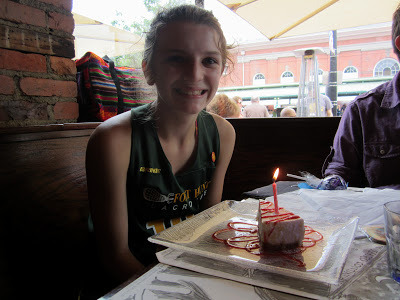
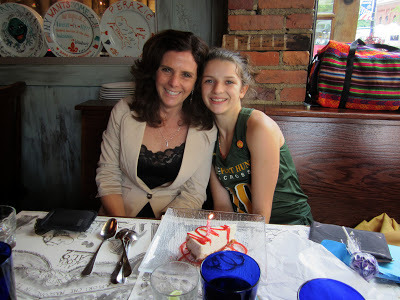
What a happy day we all had, in Washington, DC.
Happy birthday, beautiful Claire.
Have I mentioned how lucky Duke University (your dream university) will be to have you
...in six years' time?
Lucky indeed.




Published on May 19, 2013 19:02
royalty check: once again, I impress myself
Published on May 19, 2013 05:24
May 18, 2013
scarlet tanager?

outside, just now! the color of the sun at 5 AM this morning. this seems to be a scarlet tanager, though I'm not completely sure. but what a bird! what a bird!




Published on May 18, 2013 04:36
May 17, 2013
today's salsa lesson: to the challenges that sustain us
We read it all the time: We've got to challenge our brains to keep them fully engaged. We've got to challenge our brains to remain capable.
I'm particularly in need of capability-inducing challenges. I'm the sort of person who can remember the kind of ice cream I ordered at Dippy Don's as an eight-year-old but forgets the name of the person singing behind me in church (forgive me!). I can regale you with tales of memoirs loved and read (hundreds of them) but forget (just ask Libby Mosier) what tense I used for my own first young adult novel (past tense, in case you are wondering; I just checked).
I work to stave off my own decline by giving myself impossible things to do. Reading that is above my comprehension level (hey, that isn't hard). Pottery (because I'm a lifelong craft-o-phobe). And, as most of you know, ballroom dance.
This past week—my head full of too many things (and aching, too)—I was close as I have ever come to canceling the lesson. Just. No. Time. But then, in a hurry, we went. (So much of a hurry that I forgot my dance shoes, because no, we girls don't do salsa in pink Gap slippers—and yes, what does this tell you? My memory is slipping.)
Here's me with a migraine dancing with Scott, our instructor at DanceSport—videotaped so that my husband and I wouldn't forget the steps the second we left the studio. It's not pretty. The shoes are all wrong. I mess up.
But I'm keeping some blood flowing to my brain. And especially when it feels that we don't have any time for that, it's precisely what the doctor ordered.
To the challenges that will sustain us.




Published on May 17, 2013 07:11
May 16, 2013
Are MOOCs really the future of academic discourse?
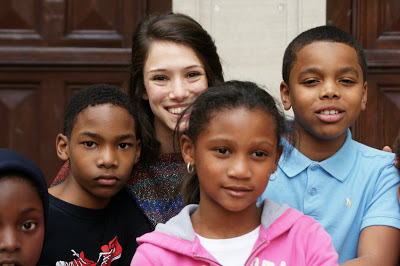
Not along ago, my friend Trey Popp wrote a thought-provoking piece in the Pennsylvania Gazette about MOOCs—massive open online courses. Trey enrolled, he persevered, he researched, he wrote. He made us think about the future of education.
MOOCs again take center stage in this week's issue of The New Yorker, where Nathan Heller asks, Has the future of college moved online? Under the guise of research, I stopped to read the piece in full. To think again about a topic that, in many ways, unnerves me.
MOOCs can, of course, be wonderfully supplemental; I've eyed a few courses myself. It can provide, for many, access to ideas and knowledge that simply didn't exist (for those many) before. There are plenty of barriers that get thrown down in the path of those wanting to learn—financial, physical, geographic—and for these hundreds of thousands, millions, even, a MOOC can be life raft material. It can equalize. It can secure.
But as a teacher in a small, crowded classroom on the University of Pennsylvania campus, as a mere adjunct who learns, time and again, that it's not the material I obsessively prepare that matters most, but the spontaneous combustion inside the teaching moment, I worry that the MOOC concept—taken too far, taken to unwarranted extremes—will slowly diminish that which I value most, and what my students (ask them) value, too.
The errant conversation. The tangential. The nonlinear. The relationships—real, non-crowdsourced—that build over time. In my classroom, I watch the postures and faces of my students. I see what they are hiding behind or wanting to express or struggling through. I show up early because I know that one, at least, will be showing up early, too—not to talk about the course, per se, but to talk about the bigger things that they are working through. Private and personal things. Internet aversive things. Nothing they'd ever want another soul to "like."
I teach memoir and literary profile. My students write weekly, read books, are read to. They do the work, and they grow as writers, but what matters perhaps even more is how they grow as people. How, through the writing work, they come to know themselves and broaden the way they think about others. How they allow language to release them, even relieve them. My students enter the room as strangers to one another other, and whether they are Wharton enrolled or bioengineers, future veterinarians or English professors, super geniuses who have essentially skipped through school or students from other lands just learning English, they forge a community that would not exist without the scratched table, the box of cookies, the breeze blowing through the velvet curtains.
All the while I'm learning, too. I'm forging the same life-long bonds. Taking the train to NYC to attend the engagement party of a recent graduate. Sending love to a once student/new mom. Helping students from two years ago publish today. Figuring out how I can get to New Orleans to see my Katie G before she heads to medical school. Writing about my Leah (above) and her own ambitions with children in the Philadelphia Inquirer. Writing recommendation letters and whispering in people's ears.
I do these things—I love to do these things—because my students are real to me, because I know them, because I've watched them, because I've given them room to be not just their academic selves, but their whole selves, because they have become my second family. They are, by and large, young. They are one person each on a large urban campus. They're struggling with others or struggling with themselves, and it means a lot to them (again, I say, ask them) that someone on that campus knows their name, or notices that they're absent, or sends an email:You can do better. Try again.
MOOCs, well managed, can do a lot of good. But let's make sure, as the future of education unfolds, that that other kind of good—that essential, human good—is not ultimately de-valued. Let's not forget what we have the responsibility to teach (good judgment, quiet reflection, attention to others, attention to one's self), along with the terms, the forms, the structures.




Published on May 16, 2013 04:33
May 15, 2013
Be here right now. (My husband talks me down from the cliff.)

"But I keep letting people down," I was saying, to my husband, who was listening. "I do my best to be where I should be, to give back to those who have given to me, to do my job, my ever-expanding job, but even so, I'm late, I'm behind, I'm absent, my friends are wondering if I'm in fact a friend."
"I haven't had my father for dinner."
"I missed a reading tonight."
"I had to say no to four kind offers."
"I'm behind and I'm behind."
I am forever walking around, I said, (imploringly), feeling some kind of version of incomplete. Feeling every kind of version of lousy. I am walking around with all kinds of failure walking after me.
My husband looked at me. He listened. There was that flick of impatience in his eyes.
"Here's what you are forgetting," he said. "You are here. Right now.
"Be here. Right now."




Published on May 15, 2013 17:40
Maria Semple reflecting on first drafts, hard work, and simplifying/sustaining choices
So enamored was I of Maria Semple's Where'd You Go, Bernadette, that I went on a hunt for Maria Semple conversations. Here she is reflecting on her first novel with words of great wisdom for all of us who sit down and try to do this work.




Published on May 15, 2013 06:22






